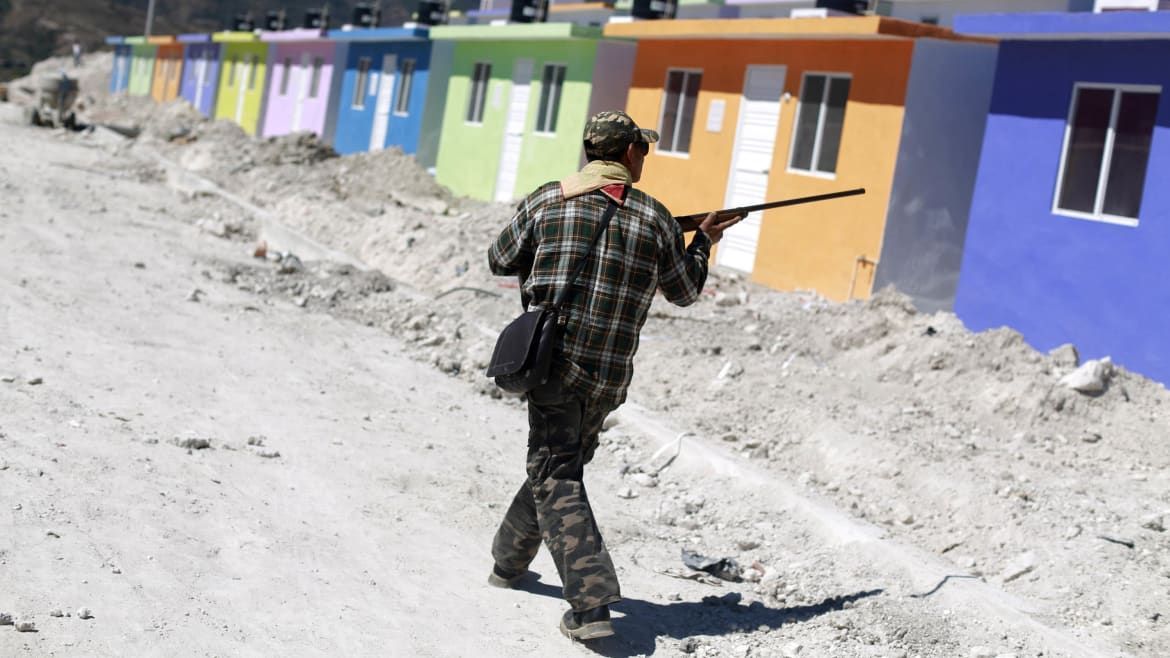FILO DE CABALLOS, Guerrero, Mexico—The assault force rolls through this small mountain town not long after dark. Traveling in a fleet of pick-ups with about 15 men in each truck, they are dressed in pixelated camouflage uniforms and ballistic vests and at first glance they look like official army units, but their weapons give them away. Many of these commandos carry AK-47 model assault rifles, which aren’t used by the Mexican armed forces.
The logo stamped on the doors of the trucks shows a figure from the Mexican Revolution wearing a sombrero and brandishing a rifle astride a charging horse. Below that are the words Policia Comunitaria, or community police, and a phrase which, roughly translated from Spanish, reads: “Death before surrender or humiliation.”
The men in the trucks are members of the United Front of Community Police of Guerrero State, better known by its Spanish acronym of FUPCEG. Tonight FUPCEG’s shock troops are on their way to assault the nearby town of El Naranjo, which is currently held by the forces of an organized crime group called the Cartel del Sur.
“We fight to free communities that have been isolated by the criminals,” says a squad leader who asks to be identified only as “El Burro” in an interview with The Daily Beast. “Everyone has a right to security. And to economic freedom. Campesinos [small farmers] and their children shouldn’t suffer under the rule of bandits,” Burro says. “The people of this town have asked us for help, and so that’s what we’re going to do.”
El Burro says he got his nickname, which means “the donkey,” because he can bear heavy loads a great distance despite his slight stature. In his backpack he carries several cans of tuna and crackers and canteens of water. His battle harness holds some 300 rounds of ammunition for his AK-47.
Later tonight he’ll lead his squad on foot through the dense pine forests that surround El Naranjo, until they reach the pre-assigned rendezvous point. From there the coordinated strike force will crawl on their bellies until they’re in sight of the cartel stronghold, then wait for dawn to attack.
Burro is a veteran of a dozen such engagements with the comunitarios and says he’s personally registered 20 confirmed kills of sicarios, the cartels’ contract killers. A former farmer, he joined the movement “because I was tired of hearing the people’s cries for help go unanswered.”
The Cartel del Sur is known for its brutal tactics, including torturing prisoners, and for that reason Burro says he prefers death on the battlefield to being captured by los contras, as he calls members of the Cartel del Sur.
“Will I come back from where I go tonight?” he asks rhetorically. “And if I don’t,” he says, “will my family understand what I died for?”
‘We Have To Protect Ourselves’
FUPCEG is an alliance of civilian autodefensas, or self-defense groups, that boasts about 11,700 fighters across 39 municipalities in Guerrero, meaning they’re now present in about half the state. Similar communitario movements have sprung up across Mexico over the last decade, but FUPCEG is by far the largest of its kind.
The spike in vigilante militias has polarized public opinion. Some observers see them as noble freedom fighters who succeed where traditional law enforcement has failed. Critics claim the autodefensas and comunitarios (the words are often used interchangeably in Mexico) are at best undisciplined mobs and at worst cartel patsies who do the criminals’ grunt work for them.
Either way, their power is growing. A new study by Mexico’s National Human Rights Commission suggests vigilante activity is up by more than 300 percent since the start of 2018, and blames the increase on “insecurity, violence, and impunity.”
In fact, violence in Mexico has reached historic levels this year, with the country averaging an all-time high of 94 killings a day through the first half of 2019. Both 2017 and 2018 also broke previous murder records. As one autodefensa fighter put it, repeating what has become a kind of mantra, “If the government can’t protect us, then we have no choice left but to protect ourselves.”
FUPCEG’s founder and leader is 40-year-old Salvador Alanis. A Guerrero native, Alanis is something of a polymath. An economist by training, he’s also worked as an electrical engineer in North Carolina, and at one time owned several successful fruit and cattle ranches in his home state. Those ranches are gone now. Some were sold off to help fund Alanis’s crime-fighting endeavors, while others have been seized by the mafia groups he opposes.
“I spent 12 years working in the U.S.,” Alanis says during an interview in the FUPCEG base in the strategically vital town of Filo de Caballos, high in the sierra of central Guerrero. “In the States I came to know a better life, a better world. I came to take safety for granted,” he says, “but there’s no security like that in Mexico.”
The lack of security is even more pronounced in Guerrero, which is Mexico’s leading exporter of opium and heroin, and perennially listed as one of the country’s most dangerous and politically corrupt regions.

